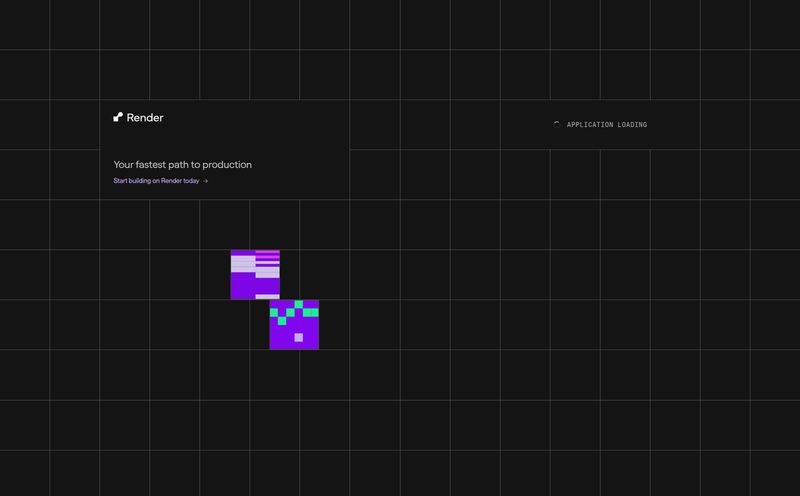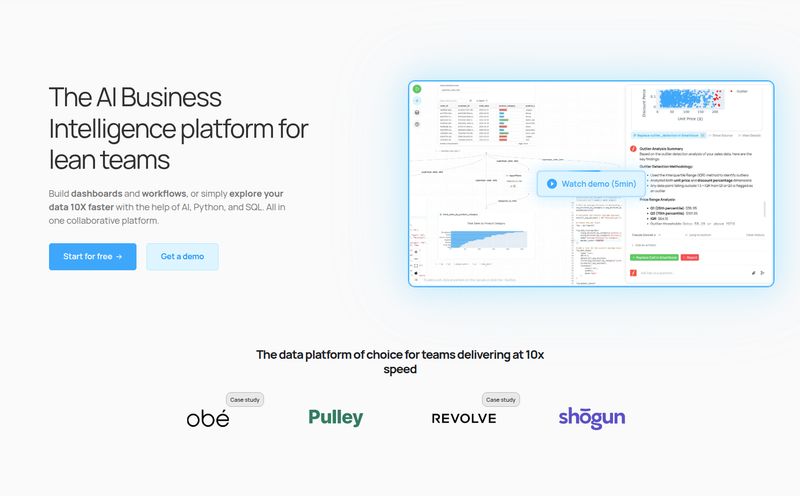We all love GitHub. It's the de facto home for our code, our collaborations, our digital blood, sweat, and tears. But when it comes to finding something new? Oof. It can be a real pain.
You know the drill. You type in what seems like a perfectly clear search term—'simple python script for exif data removal'—and you get a deluge. A torrent of abandoned projects from 2016, a dozen forks of the same popular-but-not-quite-right library, and a bunch of stuff that just happens to have your keywords in the README. It’s like yelling into the world's biggest library and hoping the right book falls off the shelf. Sometimes it works. Most of the time, it's just noise.
So, you can imagine my curiosity was piqued when I stumbled across a new tool. A simple, clean, one-page site with a bold promise: an AI-powered search engine for discovering cool repositories. No fluff. No user accounts to create. Just a search bar and a mission. My inner SEO nerd, the one who lives for better search algorithms, did a little backflip. Could this actually work?
First Impressions: A Breath of Fresh, Minimalist Air
Landing on the page is… refreshing. In an age where every new app wants to be your all-in-one 'synergistic productivity platform', this tool does the opposite. It has one job. There's a search box, a button, and that's pretty much it. I love that. It shows confidence.
It claims to be indexing over 48,000 repositories. Now, that’s not GitHub’s 400 million+, obviously. But maybe that's the point. This isn't trying to be the entire ocean; it’s trying to be a well-stocked fishing spot. It suggests curation, or at least a more focused starting point. Quality over sheer, overwhelming quantity. I’m here for it.

Visit AI Repository Search
The interface is so clean you could eat off it. This simplicity lowers the barrier to entry to basically zero. You arrive, you type, you discover. No learning curve whatsoever.
The “AI-Powered” Promise. What Does That Actually Mean?
This is the million-dollar question, isn't it? The term 'AI' gets thrown around so much it’s almost lost all meaning. It's the marketing equivalent of adding 'artisanal' to your pickles.
In this context, the hope is that it means semantic search. Instead of just matching keywords, an AI-driven search should understand the intent and context behind your query. So, a search for “how to make a discord bot that plays music” should, in theory, prioritize projects that are well-documented, recently updated, and built for that specific purpose, rather than just any repo with the words 'discord', 'bot', and 'music'.
Now, for the dose of reality. The site is pretty tight-lipped about how its AI works. It’s a bit of a black box. As someone who spends their days analyzing search trends and algorithms, I’m naturally skeptical. But I’m also optimistic. The sheer potential for an AI that understands code-related queries is immense. For now, we have to take their word for it and judge it by the quality of its results.
Who Is This For, Really?
I’ve been playing around with it for a bit, and I can see a few groups of people getting a real kick out of this.
- Developers on a Deadline: You need a specific solution, and you need it yesterday. Sifting through GitHub is a time-sink. A more intelligent search that gets you 80% of the way there in one go could be a lifesaver.
- Students and Hobbyists: When you're learning, finding good example projects is gold. You don't just want code that works; you want code that's easy to understand. I have a hunch an AI search could be better at identifying these educational gems.
- The Curious Innovator: This is me. Sometimes I just want to browse. I want to find a weird, interesting, or brilliantly clever open-source project that sparks a new idea. The promise of finding “cool” repositories speaks directly to this desire for inspiration.
I remember a few months back, I was looking for a very specific type of data visualization library in Go. It took me an entire afternoon of searching, cloning, and testing to find one that wasn't overly complicated or abandoned. A tool like this could have definitly turned that hours-long task into a ten-minute discovery session.
The Good, The Bad, and The “Coming Soon”
So, let's break it down. No tool is perfect, especially not a new one.
What I’m Liking So Far
The speed and simplicity are the big wins. The results I've gotten so far feel… different from GitHub's. Sometimes better, sometimes just interestingly alternative. It seems to have a knack for bubbling up repos that don't have a million stars but are highly relevant to my query. It's like talking to that one friend who's always into obscure indie bands instead of just the Top 40.
The Room for Improvement
The main 'con' is the mystery. I want to know more about the algorithm! And then there's that tantalizing but also slightly worrying banner: “Coming soon with something even more exciting!”. We’ve all seen that promise on websites before, right? Sometimes it heralds amazing new features. Other times, it gathers digital dust for years. I’m crossing my fingers for the former.
How It Stacks Up Against the Behemoth
Let's be clear: this tool is not a GitHub killer. And I don't think it's trying to be. GitHub is the infrastructure, the social network, the entire ecosystem. This is a specialized discovery tool that plugs a very specific gap in that ecosystem.
"It's not about replacing GitHub; it's about augmenting it. Think of it as a specialist search consultant you bring in when your general search isn't cutting it."
The best part? It's currently free. There's no pricing page, no 'contact us for an enterprise demo'. It's a tool built for developers, likely by developers, and that ethos shines through.
A Glimpse into an Exciting Future?
So what could that “even more exciting” future hold? I can only speculate.
Maybe it’s advanced filtering based on license type, recent commit activity, or even the language proficiency of the contributor. Imagine filtering for “projects suitable for intermediate Python developers.” Or what about natural language code search, where you can describe a function and it finds you code snippets that do it? The possibilities are pretty wild.
My Final Takeaway: Bookmark This One
Is this the holy grail of code discovery? Not yet. It’s a promising, intriguing, and genuinely useful tool that I’ve already bookmarked. It offers a different, and often better, lens through which to view the vast universe of open-source code.
It’s a fantastic example of using AI to solve a real-world, nagging problem for a specific community. It won't replace your workflow, but it might just become your favorite new starting point for exploration. Give it a whirl and see what hidden gems you can unearth.
Frequently Asked Questions
- What is this AI repository search tool?
- It's a specialized search engine that uses AI to help developers and researchers discover interesting and relevant code repositories from a database of over 48,000 projects.
- How many repositories does it index?
- Currently, the platform indexes over 48,000 repositories, with a focus on providing relevant results over just a massive quantity.
- Is this tool free to use?
- Yes, as of now, the tool is completely free to use. There is no pricing information available on the site.
- How is this different from searching on GitHub directly?
- While GitHub search is powerful, it's primarily keyword-based. This tool uses AI to understand the intent and context of your search, aiming to provide more relevant, 'cooler' results that you might not find easily on GitHub.
- What kind of AI does it use for search?
- The specific details of the AI algorithm are not public. However, it likely involves semantic search and natural language processing to better understand user queries beyond simple keyword matching.
- When will the new features be released?
- The website mentions "Coming soon with something even more exciting!" but does not provide a specific timeline for new feature releases.
Reference and Sources
- GitHub's Official Code Search Documentation
- Hacker News Discussion on the Challenges of Code Discovery



